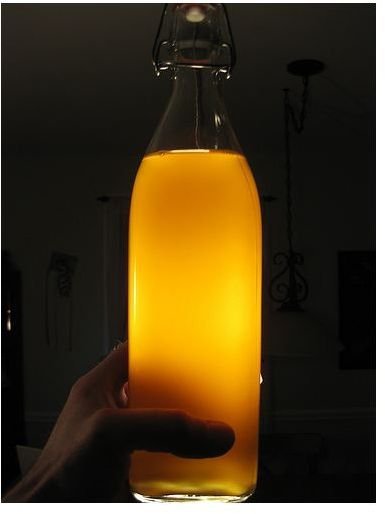Learn the Risks and Benefits of Kombucha Tea and Decide if Knowing How to Make Kombucha Tea is Right for You
What Is the Manchurian Mushroom?
Kombucha tea is not actually made from a mushroom, but from a symbiotic colony of bacteria and yeast. The kombucha culture, which looks like a jelly pancake, is added to tea and sugar and then allowed to ferment for several days. The resulting effervescent beverage is kombucha mushroom tea. The taste is best described as a combination of apple juice, wine and vinegar.
Although the exact origins of kombucha are unknown, the tea is believed to date back to 221 B.C., to the Tsin Dynasty. From China, word of the healing beverage spread to India, Russia, and eventually Japan, where it was named after the Korean physician, Kombu, who served the ‘cha’ or tea to the Emperor. Over the centuries, kombucha has faded in and out of obscurity, gaining popularity in Eastern Europe, Asia, and now the West.
Reputed Health Benefits
What are the benefits of kombucha tea? Those who have used kombucha claim that it is capable of healing, or at least relieving, almost any health problem, from cancer to hair loss. The validity of the Manchurian mushroom rests on the tea’s ability to boost the immune system and stimulate the body’s natural process of healing through probiotics, acids, and enzymes. This drink is also a rich source of the B-complex vitamins and vitamin C.
Kombucha is highly acidic, with vinegar-like properties. It has lactic acid, for blood circulation, digestive health, and the regulation of pH levels; acetic acid to inhibit the growth of dangerous bacteria; malic acid, which the body uses to detoxify; oxalic acid for energy production (although in high quantities, oxalic acid can inhibit nutrient absorption); and glucuronic acid, another chemical that assists the body’s natural elimination processes. Probiotics are extremely beneficial for digestive and immune health, and enzymes are the catalysts for the body’s natural functioning — they can encourage positive action and healing.
All of these components combined create a revitalizing cocktail. Can kombucha mushroom tea cure all degenerative diseases? Maybe not, but it is not a far-fetched claim to assume that the Manchurian mushroom enhances overall health and vitality. It should not be considered as a cure for any disease, nor should you drink this tea as a substitute for regular medical care.
How To Make Kombucha Tea at Home
This pseudo tea is often made at home. It can be purchased in the store, although commercial samples tend to be high in caffeine and sugar, and expensive. It is relatively simple to make. The first step is to have a clean, sterile working environment, this is critical to ensure the safety of the drink. Next, bring about three quarts of filtered water to a boil, and add one cup of regular white sugar. Allow this solution to boil for five minutes before removing from heat and steeping the tea. Use five tea bags of black, green, or even an herbal tea.
Once the sweet tea has cooled in a gallon-size glass jar, add the kombucha culture, with the smoother side facing up, and one quarter cup of distilled apple cider vinegar. Cover the jar with a thin towel or cheesecloth, secured with a rubber band, and let the tea ferment for about seven days. A shorter amount of time will yield a sweeter tea, while fermenting for a longer time will yield a very acidic tea. A new culture will grow during the fermentation. Both the original and the new ‘pancake’ can be stored in the refrigerator for several months.
As with anything, only drink in moderation. One to three cups per day is plenty. There is a small amount of caffeine as well as alcohol from the fermentation process.
Warnings Concerning the Manchurian Mushroom
For all the kombucha tea benefits, some still believe this so-called elixir to be a hoax. Whether it is beneficial or not is one issue, but more importantly — what are the possible risks of drinking kombucha?
The FDA put out a warning in 1995 about kombucha tea, stating that the acids in the fermenting brew can leach lead and other toxins from their container. It is for this reason that kombucha should never be made in ceramics, glass is the safest choice. Also, because of the risk of contamination from mold, people with a weak immune system should be wary of the manchurian mushroom, especially if there is any question as to the cleanliness of the environment.
Although the FDA has reported no known adverse affects of kombucha when made properly, there has been one death, and several cases of metabolic acidosis and liver damage. The high acidity level of the tea can cause a toxic reaction if too much is introduced into the body. Acidosis can lead to a number of serious problems such as kidney failure.
Uncontaminated and in moderation, kombucha tea is only known to be perfectly safe. Some people experience minor stomach problems the first time they drink the tea, and there are cases of allergic reactions. Despite the low risk, and possibly groundbreaking benefits, kombucha remains a home remedy for the daring. The general medical and scientific community do not endorse the healing benefits of kombucha tea because there is no scientific evidence to support it. People searching for an alternative therapy are left to make their own personal judgement on kombucha.
References
Please read this disclaimer regarding the information you have just read.
